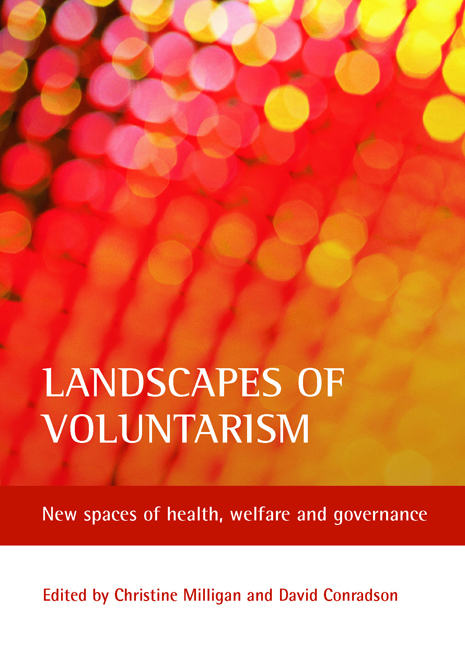Book contents
- Frontmatter
- Contents
- List of tables, figures, maps and plates
- Notes on contributors
- Foreword: Beyond the shadow state?
- one Contemporary landscapes of welfare: the ‘voluntary turn’?
- two A ‘new institutional fix’? The ‘community turn’ and the changing role of the voluntary sector
- three Renewal or relocation? Social welfare, voluntarism and the city
- four Voluntarism and new forms of governance in rural communities
- five New times, new relationships: mental health, primary care and public health in New Zealand
- six Informal and voluntary care in Canada: caught in the Act?
- seven Competition, adaptation and resistance: (re)forming health organisations in New Zealand’s third sector
- eight The difference of voluntarism: the place of voluntary sector care homes for older Jewish people in the United Kingdom
- nine Values, practices and strategic divestment: Christian social service organisations in New Zealand
- ten Faith-based organisations and welfare provision in Northern Ireland and North America: whose agenda?
- eleven Government restructuring and settlement agencies in Vancouver: bringing advocacy back in
- twelve Developing voluntary community spaces and Ethnicity in Sydney, Australia
- thirteen The voluntary spaces of charity shops: workplaces or domestic spaces?
- fourteen The changing landscape of voluntary sector counselling in Scotland
- fifteen Volunteering, geography and welfare: a multilevel investigation of geographical variations in voluntary action
- sixteen Reflections on landscapes of voluntarism
- Index
two - A ‘new institutional fix’? The ‘community turn’ and the changing role of the voluntary sector
Published online by Cambridge University Press: 15 January 2022
- Frontmatter
- Contents
- List of tables, figures, maps and plates
- Notes on contributors
- Foreword: Beyond the shadow state?
- one Contemporary landscapes of welfare: the ‘voluntary turn’?
- two A ‘new institutional fix’? The ‘community turn’ and the changing role of the voluntary sector
- three Renewal or relocation? Social welfare, voluntarism and the city
- four Voluntarism and new forms of governance in rural communities
- five New times, new relationships: mental health, primary care and public health in New Zealand
- six Informal and voluntary care in Canada: caught in the Act?
- seven Competition, adaptation and resistance: (re)forming health organisations in New Zealand’s third sector
- eight The difference of voluntarism: the place of voluntary sector care homes for older Jewish people in the United Kingdom
- nine Values, practices and strategic divestment: Christian social service organisations in New Zealand
- ten Faith-based organisations and welfare provision in Northern Ireland and North America: whose agenda?
- eleven Government restructuring and settlement agencies in Vancouver: bringing advocacy back in
- twelve Developing voluntary community spaces and Ethnicity in Sydney, Australia
- thirteen The voluntary spaces of charity shops: workplaces or domestic spaces?
- fourteen The changing landscape of voluntary sector counselling in Scotland
- fifteen Volunteering, geography and welfare: a multilevel investigation of geographical variations in voluntary action
- sixteen Reflections on landscapes of voluntarism
- Index
Summary
Introduction
Why has the voluntary and community sector become increasingly fashionable in social policies over recent years? This chapter explores how policies for regenerating deprived areas and tackling different aspects of social exclusion in the UK have taken what we describe as a ‘community turn’ which embraces an enhanced role for the voluntary and community sector (Imrie and Raco, 2003; Taylor, 2003).
The basis of our argument is that the voluntary and community sector appears to serve as a putative solution to a number of governing dilemmas. It offers governments the prospect of addressing, and being seen to address, intractable problems through welfare services provided beyond the state, which are thought to involve lower costs while being effective and innovative.
In turn we discuss three major tools of the ‘community turn’ at local level – governance, partnership and capacity building – to explore how relationships between local government and voluntary organisations are being reshaped. We argue that the emergence of an enhanced role for the sector can fruitfully be seen as part of an attempted ‘institutional fix’ (Peck and Tickell, 1994) in a broader project to restructure the postwar welfare state in an era of fiscal constraint.
The chapter concludes by considering the broader geographical consequences of the ‘community turn’ for voluntarism and for the changing ‘postnational’ welfare state. We suggest that the ‘community turn’ involves specific constructions of space, scale and temporality, which not only have important consequences for the shape and structure of the emerging welfare state, but also for the construction of a differentiated voluntary and community sector.
The ‘community turn’ in public policy
Before being heckled and given a slow hand-clap by the Women's Institute triennial conference in June 2000, the UK Prime Minister Tony Blair neatly summarised the importance of ‘community’ and ‘community renewal’ to the New Labour ‘project’ of responding to a rapidly changing society:
At the heart of my beliefs is the idea of community. I don't just mean the local villages, towns and cities in which we live. I mean that our fulfilment as individuals lies in a decent society of others.
- Type
- Chapter
- Information
- Landscapes of VoluntarismNew Spaces of Health, Welfare and Governance, pp. 15 - 32Publisher: Bristol University PressPrint publication year: 2006



